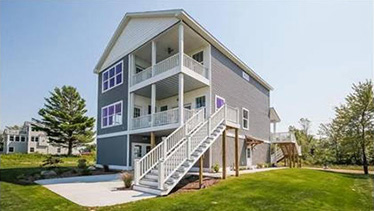What To Expect When Building a New Modular Home

Building a new modular home is a process that offers several advantages, such as faster construction timelines, cost savings, and customization options. Tidewater Custom Modular Homes would like to know what to expect when building a new modular home:
Design and Planning:
- Site Selection: Choose a suitable piece of land for your modular home. Consider factors like location, accessibility, utilities, zoning regulations, and any environmental considerations.
- Design Selection: Work with an architect or modular home manufacturer to design your home. Modular homes can be highly customizable, so you'll have options to choose layouts, materials, finishes, and other design elements.
- Budgeting: Establish a budget for your project, including the cost of the modular home itself, site preparation, foundation, utilities, permits, and any additional features or upgrades.
Selecting a Modular Home Manufacturer:
- Research and choose a reputable modular home manufacturer or builder. Check references, view past projects, and consider their experience and reputation.
Site Preparation:
- Clear the chosen site, including any trees, debris, or existing structures.
- Prepare the foundation, which can be a full basement, crawl space, or slab foundation, depending on your preferences and local building codes.
Ordering the Modular Home:
- Once your design is finalized, the modular home manufacturer will begin construction of the individual modules in their factory. The modules are typically constructed with the same quality materials and standards as traditional stick-built homes.
- Factory construction often occurs simultaneously with site preparation, reducing the overall construction timeline.
Transportation and Installation:
- Once the modules are completed, they are transported to your site. This may involve multiple trips if the home is particularly large.
- On-site, a crane or specialized equipment will lift and place the modules onto the foundation. The modules are then sealed and secured together, and any necessary finishing work is completed.
Utilities and Finishing:
- Connect utilities such as water, electricity, plumbing, and HVAC systems to the modular home. This may require coordination with local service providers.
- Interior and exterior finishing work is completed, including roofing, siding, painting, flooring, cabinetry, and fixtures.
Inspections and Approvals:
- Modular homes, like traditional homes, must undergo inspections to ensure they meet local building codes and safety standards.
Occupancy:
- Once all inspections and approvals are obtained, you can move into your new modular home.
Warranty and Maintenance:
- Modular homes typically come with warranties on various components. Familiarize yourself with the warranty terms and perform regular maintenance to keep your home in good condition.
Building a modular home can be a quicker and more efficient process compared to traditional construction methods. However, it's essential to work with experienced professionals like Tidewater Custom Modular Homes and follow local building codes and regulations throughout the process to ensure a successful and safe outcome.


